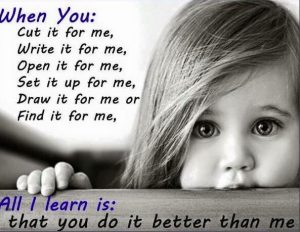What can I expect from my child?

Many parents have enquired about what their child should be doing at their age after reading our last blog.
Here are some examples and ways to support your child to be self-independent:
Note: This is not an exhaustive list but a general guideline of skills and tasks.
At 12 months old, your child can:
- Begin to pick up small pieces of food with his/her thumb and index finger.
- Start offering them small, soft dissolvable solids (e.g. Cruskits and soft crackers).
- Rubs washcloth on body/ dries hands on towel.
- Let your child attempt to wash themselves in bath.
- Instruct your child to dry his/her hands after washing.
At 12- 18 months old, your child can:
- Understand 1- part simple instructions (e.g. ‘get the ball’) instructions
- Start giving your child simple jobs and responsibilities (e.g. ‘Get your shoes’, ‘put tissue in the bin’).
- Begin to self- feed with a spoon, but may turn the spoon over on the way to the mouth
- Let your child feed themselves with a spoon during snack time (e.g. yoghurt or pureed fruit).
- Give your child a spoon to hold and feed themselves during meal times whilst you feed the majority of food with another spoon.
- Put objects in a container and take them out
- Instruct your child to pack away after play or put dirty clothes in laundry basket.
- Puts on pieces of clothing/ take clothing off
- Help your child step into their pants and ask them to pull the pants up or stretch their hand through a shirt.
At 2 years old, your child can:
- Feed themselves with spoon without spilling
- Give them a spoon, start with thicker textures (e.g. scooping jelly or pudding) then progress to more runny liquids (i.e. soups).
- Drinks from an open mouth cup without assistance
- Offer drinks in an open cup. You may verbally remind them to hold with two hands or give them a smaller cup.
- Put shoes on with some assistance
- Help your child step into his/her shoes, then instruct him/her to stick the Velcro straps on.
- Zip and unzip jackets
- Help your child fasten the zip and instruct him/her to pull the zip up.
- Carry mealtime utensils (e.g. cup, plate, cutlery) to the sink or counter when finished.
- Removes clothing (without fasteners) independently.
At 3 years old, your child can:
- Understand 2- part instructions and more concepts (e.g. location, quantity, descriptive words)
- Give longer instructions with different concepts to locate objects (e.g. ‘Find your bag under your bed’).
- Give instructions to complete tasks (e.g. ‘Throw this in the bin and give me your dirty socks).
- Opens and closes backpack independently, puts in objects when requested
- Give items for preschool to your child to pack in his/her bag and zip it up.
- Use a fork to feed self
- Cut meat or fruit into chunks and give your child a fork.
- Be independent with toileting routine including ripping toilet paper, wiping and flushing toilet.
At 4 years old, your child can:
- Brushes hair and teeth independently
- Give your child the comb and verbally instruct if support is required.
- Let your child squeeze toothpaste on his/her toothbrush.
- Help feed pets
- Let your child pour or scoop pet food into bowl and feed your pet.
- Allow your child to attempt to dress themselves including fasteners.
At 5 years old, your child can:
- Assist with cooking: stirs, pours
- Ask your child to help with getting ingredients for baking/ cooking.
- Allow your child to stir and pour ingredients.
- Help prepare snacks (e.g. spreading butter or jam on bread).
- Help with table setting
- Ask your child to set the table before meal.
Always praise your child for trying! Support your child by breaking down these tasks into steps allows positive learning experience, which leads to better success.
If you have further questions about how to break down the steps to teach different skills, please feel free to contact us on info@walkietalkieearlyintervention.com.au.
Useful resources
Speech Pathology Australia, Communication Milestones https://www.speechpathologyaustralia.org.au/SPAweb/Resources_for_the_Public/Children_Communication_Milestones/SPAweb/Resources_for_the_Public/Communication_Milestones/Communication_Milestones.aspx?hkey=fb6753df-a757-4c4a-8100-aaebdd4451fd
